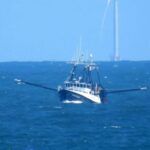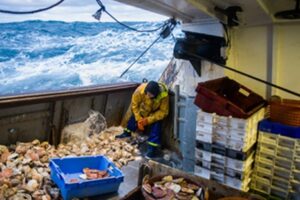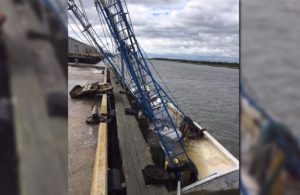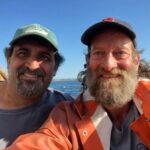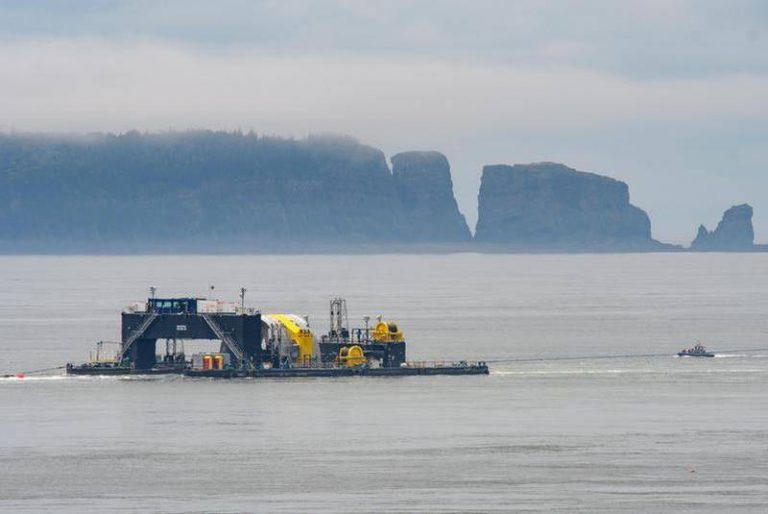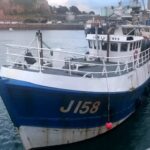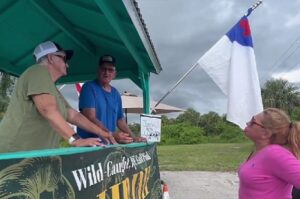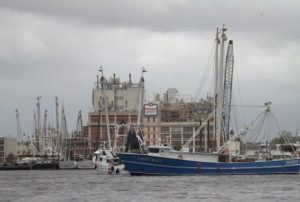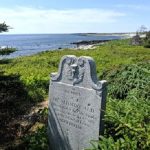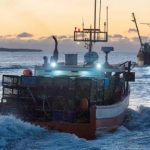Tag Archives: Glen Spain
Commercial salmon fishermen eye Klamath dam removal with cautious hope
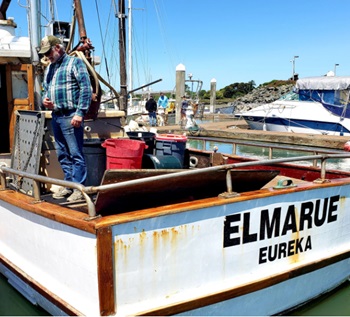 At 76, he still fishes for salmon alone. Standing in the cockpit on the stern deck of his wooden trawler, Elmarue, he can keep an eye on all six wires; when one of the lines starts to dance, he brings the fish in, stunning it with his gaff while it’s still in the water. Then he uses the tool to hook the salmon behind the gills and swings it onto the deck. “By the way, I want that fish cleaned and chilling in a single water flush within half an hour; that’s the standard,” says Dave Bitts. “I want you to enjoy eating it as much as I enjoyed catching it.”In April, for the second year in a row, the Pacific Fishery Management Council voted unanimously to close California’s commercial and recreational ocean salmon fishery. The closure was based on woefully low numbers of adult salmon expected to return to several California rivers. more, >>CLICK TO READ<< 12:58
At 76, he still fishes for salmon alone. Standing in the cockpit on the stern deck of his wooden trawler, Elmarue, he can keep an eye on all six wires; when one of the lines starts to dance, he brings the fish in, stunning it with his gaff while it’s still in the water. Then he uses the tool to hook the salmon behind the gills and swings it onto the deck. “By the way, I want that fish cleaned and chilling in a single water flush within half an hour; that’s the standard,” says Dave Bitts. “I want you to enjoy eating it as much as I enjoyed catching it.”In April, for the second year in a row, the Pacific Fishery Management Council voted unanimously to close California’s commercial and recreational ocean salmon fishery. The closure was based on woefully low numbers of adult salmon expected to return to several California rivers. more, >>CLICK TO READ<< 12:58
Dungennes crab fishery held up again by recent whale and turtle entanglements
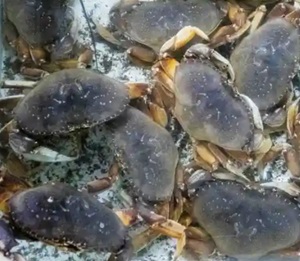 Before the restrictions, the crab fishing season off California started before Thanksgiving, in plenty of time for holiday tables. In recent years, fishermen’s ability to drop their gear has been pushed back because whales and turtles were still be spotted in their fishing zones. This season, fishermen can start dropping their crab pots on Jan. 5, and only in the two most northern California zones. In central and southern California no start date has been announced. Officials with the Pacific Coast Federation of Fishermen’s Associations said the industry does its best to avoid whales and have accepted limiting the seasons, but notes that since the restrictions have been in place, the industry has dropped from 450 active vessels to fewer than 100 and has lost out on tens of millions of dollars. more, >>click to read<< 07:47
Before the restrictions, the crab fishing season off California started before Thanksgiving, in plenty of time for holiday tables. In recent years, fishermen’s ability to drop their gear has been pushed back because whales and turtles were still be spotted in their fishing zones. This season, fishermen can start dropping their crab pots on Jan. 5, and only in the two most northern California zones. In central and southern California no start date has been announced. Officials with the Pacific Coast Federation of Fishermen’s Associations said the industry does its best to avoid whales and have accepted limiting the seasons, but notes that since the restrictions have been in place, the industry has dropped from 450 active vessels to fewer than 100 and has lost out on tens of millions of dollars. more, >>click to read<< 07:47
Sonoma County snags disaster relief designation for salmon fishery devastation
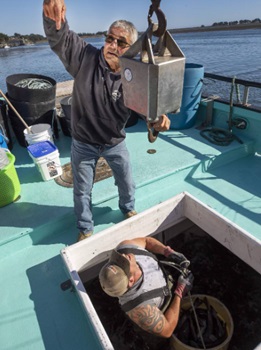 “Small businesses in Sonoma County that rely on salmon fishing for their livelihood were devastated when the fishery was shut down,” said county Supervisor Lynda Hopkins, whose district encompasses the Sonoma Coast. Hopkins added the business loans are intended “to help them recover. The SBA also lists other, bordering counties, with the presumption that those “may have suffered economic injury as well.” These include Napa, Marin, Solano, Mendocino and Lake. “We have lost 80% of our fleets in the last 40 years,” said Glen Spain, executive director of the Pacific Coast Federation of Fishermen’s Associations, which manages about a dozen fishing groups. He defined California’s $45 million fishing industry as being especially hard hit with state Fish and Wildlife’s permits dropping from 7,744 in 1980 to 1,006 this year. “These loans are trying to keep people intact as much as possible,” Spain said. photos, more, >>click to read<< 14:38
“Small businesses in Sonoma County that rely on salmon fishing for their livelihood were devastated when the fishery was shut down,” said county Supervisor Lynda Hopkins, whose district encompasses the Sonoma Coast. Hopkins added the business loans are intended “to help them recover. The SBA also lists other, bordering counties, with the presumption that those “may have suffered economic injury as well.” These include Napa, Marin, Solano, Mendocino and Lake. “We have lost 80% of our fleets in the last 40 years,” said Glen Spain, executive director of the Pacific Coast Federation of Fishermen’s Associations, which manages about a dozen fishing groups. He defined California’s $45 million fishing industry as being especially hard hit with state Fish and Wildlife’s permits dropping from 7,744 in 1980 to 1,006 this year. “These loans are trying to keep people intact as much as possible,” Spain said. photos, more, >>click to read<< 14:38
California’s Central Valley Chinook Are Getting Lost on Their Way Home
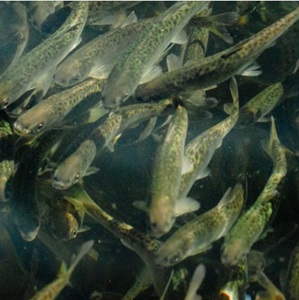 Picture yourself: a chinook salmon in the prime of your life. You dart through the water off California’s central coast, winding through kelp and dodging hungry sea lions. Long, sleek and silver, dappled with dark spots. Eyes wide and vigilant. More than 20 kilograms of pure muscle. You’ve been out at sea for several years now, first voyaging north along the Oregon coastline, then westward into deeper water. As winter approaches and the days grow shorter, you’ve found your way back to California. You’ve felt the seasons turn before, but this year, it means something special. Your kind, the Central Valley chinook—what fishers call the king salmon—are not born at sea. For thousands of years, your ancestors began their lives in the heart of California, where tributaries and streams flow together to form the mighty Sacramento and San Joaquin Rivers. photos, >>click to read<< 08:31
Picture yourself: a chinook salmon in the prime of your life. You dart through the water off California’s central coast, winding through kelp and dodging hungry sea lions. Long, sleek and silver, dappled with dark spots. Eyes wide and vigilant. More than 20 kilograms of pure muscle. You’ve been out at sea for several years now, first voyaging north along the Oregon coastline, then westward into deeper water. As winter approaches and the days grow shorter, you’ve found your way back to California. You’ve felt the seasons turn before, but this year, it means something special. Your kind, the Central Valley chinook—what fishers call the king salmon—are not born at sea. For thousands of years, your ancestors began their lives in the heart of California, where tributaries and streams flow together to form the mighty Sacramento and San Joaquin Rivers. photos, >>click to read<< 08:31
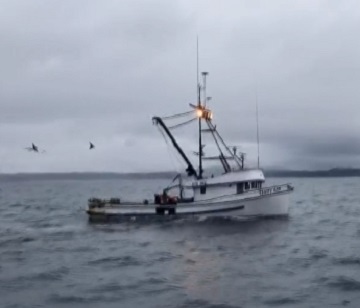
Imperiled Chinook salmon runs close ocean fishing off California, much of Oregon
The closure currently runs through May 15 and affects a length of the coast stretching from Oregon’s Cape Falcon, near Cannon Beach, south to the Mexican border. And it could be extended, officials said, as the imperiled species struggles amid a long-running drought. Further closures are likely, said Eric Schindler, head of the Oregon Department of Wildlife’s Ocean Salmon Program.“It doesn’t look good for this year or next year, and possibly the year after that, because of the drought conditions in California,” Schindler said. “We have to make sure that we’re not undermining our ability to produce salmon for the next go around.” Video, >click to read< 10:35
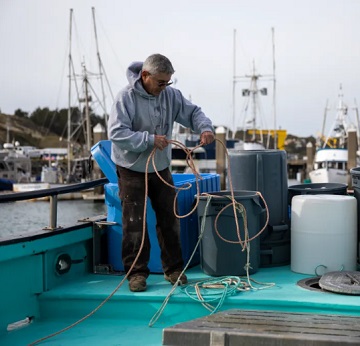
No California salmon: Fishery to be shut down this year
Last year, California’s commercial and recreational fishing fleet, from the Central Coast to the Oregon border, landed about 300,000 salmon. But this year, Davis and other salmon anglers won’t be fishing for salmon at all. Last year, the industry’s economic value was an estimated $460 million for fish sales and related businesses, including restaurants, tackle shops, private fishing guides, campgrounds and other services. Salmon season usually runs from May through October. Only in two previous years — 2008 and 2009 — has California’s salmon season been shut down completely. That closure came as the numbers of spawning fish returning to the Sacramento River, the state’s main salmon producer, crashed to record lows. Now California’s Chinook runs have collapsed again. >click to read< 09:54
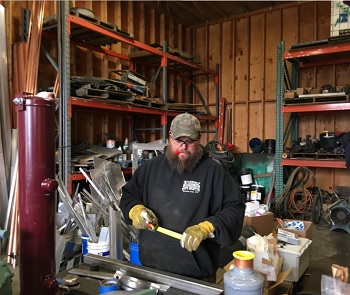
Coronavirus: Restaurant Closures Put Oregon Seafood Industry In Limbo
Commercial fisherman Clint Funderburg should be on the ocean right now, catching Dungeness crab on his fishing boat, the Widgeon. When crab prices tanked a few weeks ago, he shifted gears to his off-season side gig. So, he’s building a refrigeration system for one of the many fishing boats that are stuck at the dock right now. Mandatory restaurant closures during the coronavirus pandemic have sent shock waves through Oregon’s $700 million seafood industry. The overwhelming majority of the seafood that lands on Oregon’s docks gets eaten in restaurants, and no one knows when that market will return. In the meantime, fishermen are parking their boats as seafood prices plummet. >click to read< 18:04

Orcas, fishermen are both endangered species
Orcas and commercial salmon fishermen share a common crisis — both need more adult Chinook salmon to return to the Columbia River; orcas to avoid starvation, fishermen to sustain their livelihoods and families. Northwest orcas are starving and their population is declining — only 74 remain, in large part because their primary prey, Chinook salmon, have been pushed by dams, dewatering and habitat destruction to near extinction almost everywhere.,, Salmon fishermen too are now effectively an endangered species, and for the same reasons as orcas — their Chinook salmon prey. <click to read<
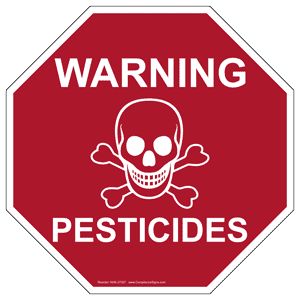
US review shows pesticides harm threatened salmon, whales
Federal scientists have determined that a family of widely used pesticides poses a threat to dozens of endangered and threatened species, including Pacific salmon, Atlantic sturgeon and Puget Sound orcas. The National Marine Fisheries Service issued its new biological opinion on three organophosphate pesticides — chlorpyrifos, diazinon and malathion — after a yearslong court fight by environmental groups. >click here to read< 19:58 


































